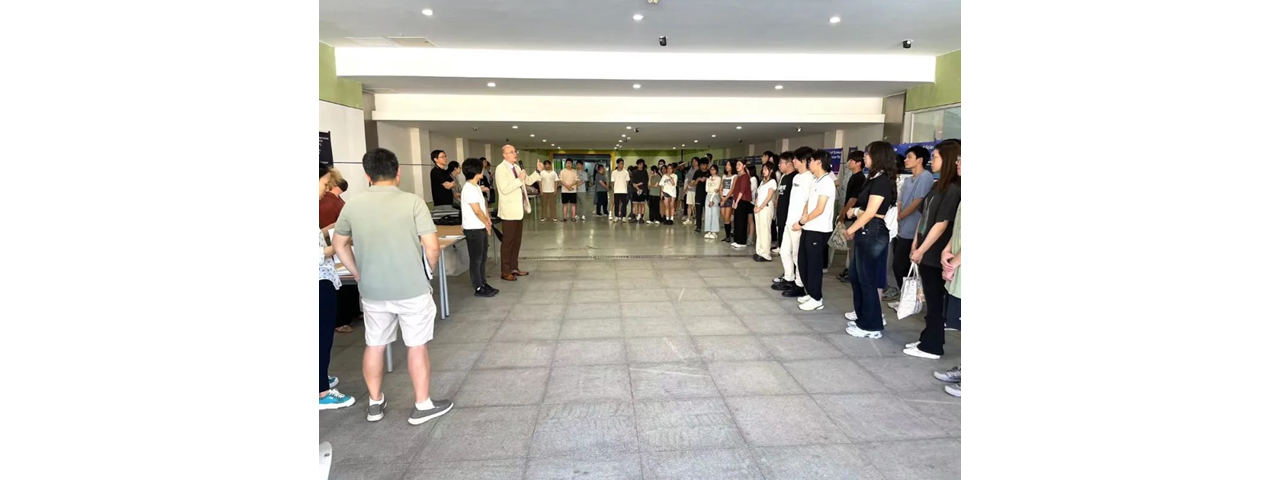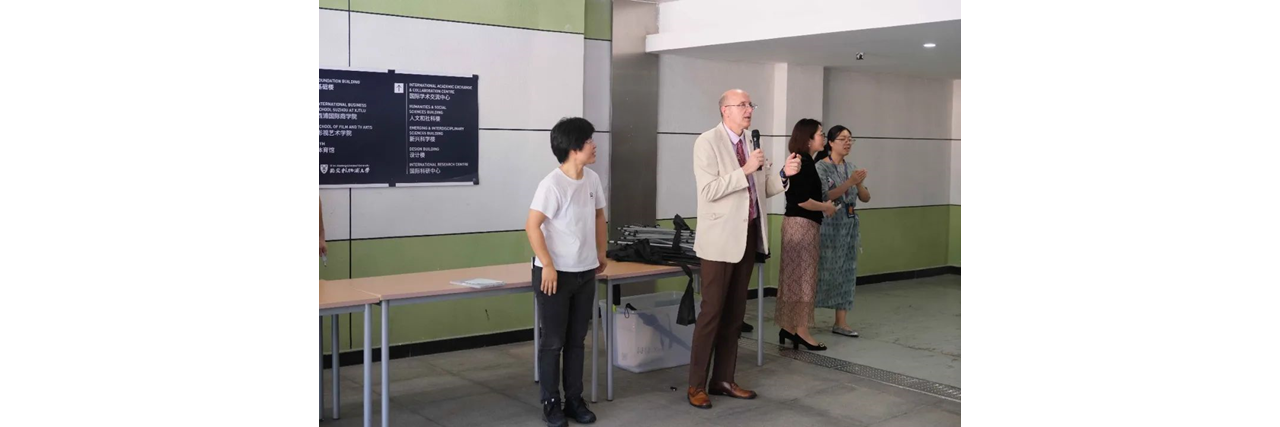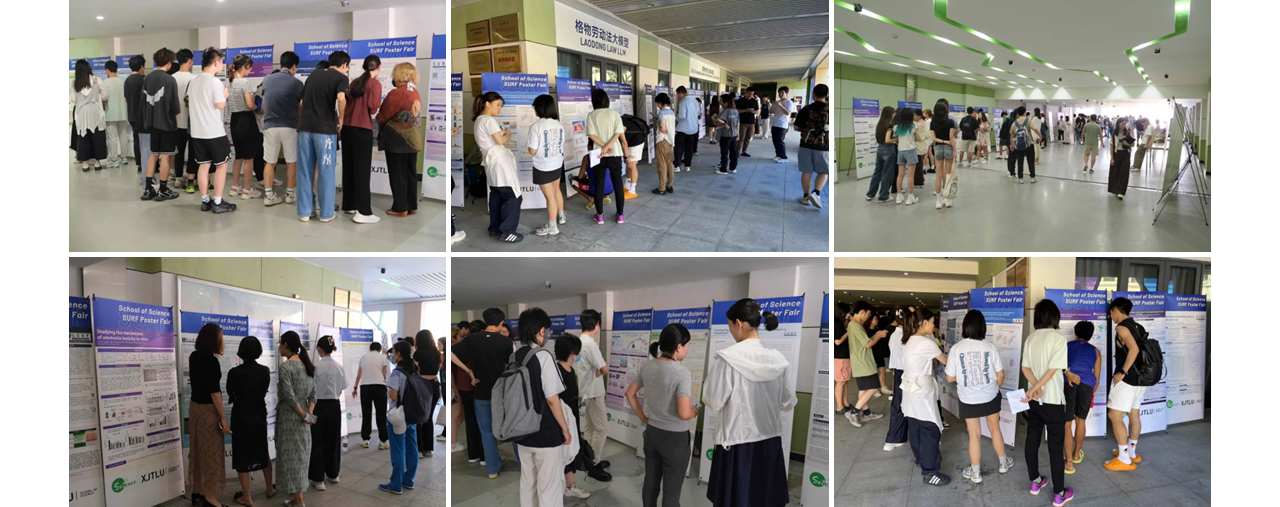17 Oct 2024

On September 13th, the inaugural 2024 School of Science SURF Poster Fair (Summer Undergraduate Research Fellowships, SURF) was successfully held at the XJTLU campus. The event featured a total of 50 high-quality research projects, with the participation of over 200 students across campus. Ultimately, 10 Excellent Project Awards and 2 School Excellence Awards were selected.

Professor John Moraros, Dean of the School of Science, addressed the student participants, saying, " This is a significant academic event showcasing the research achievements of our undergraduate students. I expect you to set high standards for innovation and excellence not only for the School of Science but for the entire university. Take advantage of this poster exhibition to actively engage with your peers and faculty mentors and highlight your research findings. The School of Science will continue to support you in your academic journey, helping you to gain the knowledge and skills necessary to make continuous progress and a positive impact to the development of our society."
What is the SURF project? What are the growth opportunities that participating in SURF brings? Let’s hear from the faculty and students in the School of Science.
School Faculty Sharing
Dr Juan Li
Assistant Professor from the Department of Health and Environmental Sciences, School of Science, Acting as the Marshal of the School of Science SURF Poster Fair
Q: Why organize a poster fair?
This year, our School of Science is hosting our first in-person SURF poster fair, aiming to return to the essence of academic poster presentations, fostering face-to-face, direct, and in-depth exchanges between student researchers and the audience. Compared to online formats, in-person exhibitions offer the advantage of providing students with more direct and effective feedback, allowing them to enhance their presentation and communication skills. Moreover, face-to-face interactions create valuable opportunities for students to build closer academic connections with like-minded peers and faculty members.
Q: What are your thoughts on the students' projects this year?
This year, we've witnessed unprecedented enthusiasm from both faculty and students in our School of Science and its three sister departments (Biological Sciences, Chemistry and Health and Environmental Sciences) for SURF. With a total of 50 student posters on display, the scale of participation significantly surpasses that of previous years. Some SURF projects even attracted 20 to 30 student applicants, highlighting the fierce competition. The overall quality of the projects is outstanding, with some of the on-site presentations being particularly impressive. The projects, as a whole, demonstrate the students' solid research abilities and innovative thinking.
Q: Do you recommend SURF participation for students?
I strongly encourage the School of Science students to actively participate in the SURF program. Through this program, students can experience the entire research cycle firsthand, from topic selection to result presentation. It allows them to apply their classroom knowledge to real-world problems. This experience not only deepens their understanding of what is studied but also provides a solid foundation for further study and strong postgraduate applications.
Dr Yongtao Zhu
Associate Professor from the Department of Biological Sciences, School of Science
Q: Can you tell us about your team and their SURF project?
We developed genetic tools to modify the biosynthetic pathways of pigmentation compounds in two environmental bacteria, Flavobacterium johnsoniae and Chitinophaga pinensis. The success of this project laid a foundation for us or other researchers to activate or enhance the production of antimicrobial drugs or other bioactive compounds by the two bacteria.
Q: What do you expect students to gain from your project?
I expect the students to gain a sense of curiosity on scientific questions, the ability of conducting experiments independently, and the experience of either fail or succeed in research.
Q: What skills or knowledge do you expect students to acquire from your project?
Addition to teaching necessary lab techniques, I focus on developing their time-management, self-learning, and problem-solving skills
SURF Students' Experiences
Q: What have you gained from participating in Surf projects?
Leyang Gu (BSc Bioinformatics)
The SURF project helped me better understand the application of deep learning in medical image processing and broadened my vision of the future development of AI.
Yukun Jiang (BSc Biological Sciences)
As a first-year student, I had never worked in a biology lab and conducted experiments before joining the surf project. SURF transformed me from a lab newcomer into a student with a basic understanding of experiments and research. Additionally, I became more willing to read scientific papers as I gradually understood their structure.”
Shuaiqin Diao (BSc Biological Sciences)
By participating in this summer's SURF project 'Chemiresistive Escherichia Coli Semi-Quantification Sensor', I had the opportunity to learn the culture and counting methods of E.coli, which laid a certain foundation for my future studies in biology and chemistry.
Ziqing Wang (BSc Applied Chemistry)
Through the project titled ‘Chemiresistive Escherichia Coli Semi-Quantification Sensor’, I learned some professional knowledge about the electrochemical impedance spectrum(EIS), and improved my experimental operation level in the process of the experiment, including using the SEM machine. I also enhanced my ability to conduct literature reviews during the preparatory work.
Lanxi Bai (BSc Applied Chemistry)
This summer’s SURF project, ‘Chemiresistive Escherichia coli Semi-Quantification Sensor,’ taught me Frequency Response Analysis (FRA), the main detection method in electrochemical impedance spectroscopy (EIS) for measuring the relationship between impedance and E. coli numbers. I also developed skills in improving experiments, such as using scanning electron microscopy (SEM) to select the most suitable structures of Bovine Serum Albumin (BSA) and conducting selectivity tests of E. coli to ensure more accurate and reliable data.
Kehua Chen (BSc Environmental Science)
I believe my greatest takeaway from this project is gaining a deeper understanding of the complexity of experiments. When conducting our own experiments, we are often faced with intricate situations, and some factors are difficult to observe without hands-on experience. For example, although we initially designed each plot with theoretically similar soil conditions, during the actual experiment, we noticed that the weed growth in one particular plot was highly abnormal. Despite identical weeding frequency, weeds grew more densely in the area with higher weeding intensity than in the area with lower intensity. As a result, we had to discard the data from this plot. Later, we observed a strip in the field where the weeds were significantly taller than elsewhere, and the abnormal plot was located within this strip. We analyzed the situation and concluded that it was likely caused by uneven soil turnover due to the tractor. The strip coincided with the tractor’s tracks, and varying soil turnover likely impacted soil fertility and seed distribution, leading to this irregularity.
There are numerous factors to consider during practical experimentation, and it is crucial to plan ahead from multiple dimensions to minimize unnecessary interference. Moreover, the experimental conditions for this project were quite challenging, requiring team members to work in the rice fields under the sun while collecting data. This experience gave us a real sense of the difficulties involved in the research process.
Yuxuan Bao (BSc Environmental Science)
After participating in SURF, I had the opportunity to meet an outstanding group of team members. During the project, I gained knowledge about rice cultivation and weed competition, and I learned how to process data related to rice growth characteristics. I also became aware of the importance of rigorous data handling and the significance of teamwork during field experiments.

Interview, New media: Luyao Wang
Review: Professor John Moraros, Dr Lifeng Ding
17 Oct 2024








